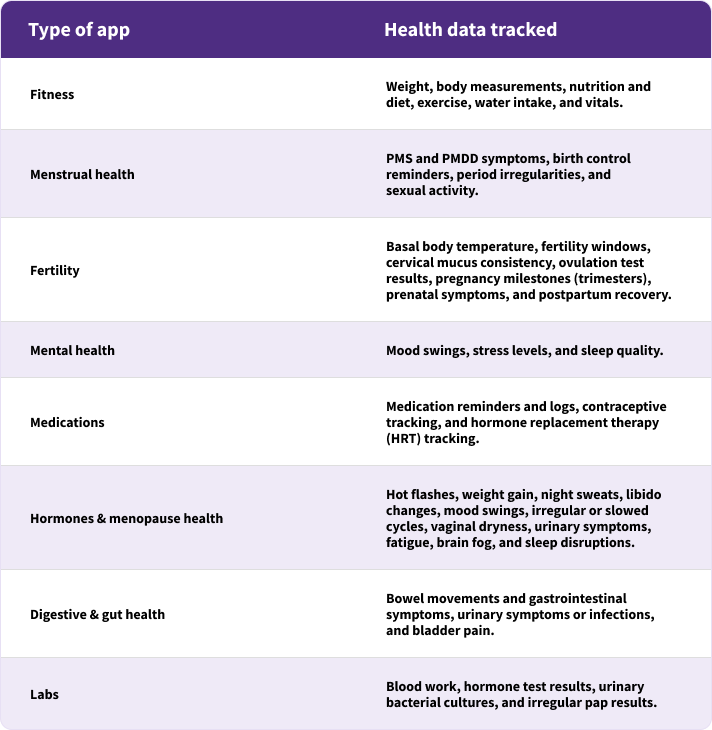Insights on how women’s health apps empower patients, and the critical data that can enable clinicians to provide more comprehensive care
Women’s health is undergoing a massive shift. Today, more and more women are looking for a comprehensive approach to care, and this increased awareness is driving critical changes in the market. According to a recent report, investment in women’s health and wellness hit $2.6 billion in 2024, an unprecedented milestone that reflects how our understanding of women’s healthcare continues to broaden over time.1
Rather than focusing women’s wellness solely on reproductive health, the industry is beginning to see the expansion of care into many different subspecialties, including areas like endocrinology and menopause support. In the same way, women are seeking out tools and clinicians that enable them to receive more holistic care for every phase of their life — not just childrearing.
Enter: the women’s health app. These specialized mobile applications aid in the effort to transform women’s health by giving women much-needed visibility into the many different facets of their overall health, including reproductive health, mental health, fitness, and more.
So, why are these apps relevant to clinicians? And what can women’s health specialists learn from the data, trends, and insights provided by these tools?
Turns out, a lot can be gleaned from these health trackers, including data that can prove critical to providing comprehensive care and helping patients manage symptoms and chronic women’s health conditions. Let’s first take a look at what types of women’s health apps exist today in order to understand their true value to clinicians.
What kinds of women's health apps are out there?
To personalize care and build stronger wellness plans, women’s health specialists first need to understand which apps patients use — and the data those tools help track over time.
1. Fitness Trackers – Apps can track valuable information like weight, heart rate, and steps, and users can also track their progress with physical therapy, such as pelvic floor therapy, before or after childbirth.
2. Period Apps – These apps can help women monitor hormone fluctuations across the follicular, ovulation, luteal, and menstrual phases. Symptom trackers within these apps also help women detect the likeliness of chronic conditions like PCOS and endometriosis based off menstrual cycle data and irregularities.
3. Fertility Trackers – Tracking apps for fertility help monitor ovulation phases, egg counts (via blood tests and AMH levels), what days of the month a patient is most likely to conceive, and can help keep track of IVF medication and treatment.
4. Mental Health Apps – Conditions like Premenstrual Dysphoric Disorder (PMDD) can cause altered moods and depressive episodes, in which mental health apps can be critical to monitor mood changes and help women manage symptoms.
5. Sexual Health Apps – Certain apps are aimed at helping young women learn more about their menstrual cycle, common PMS symptoms, and sexual health. Users can even submit anonymous questions to clinicians on women’s health topics that might be more difficult to discuss with a parent, helping them get valuable sex and reproductive education where it might not already be available.
6. Menopause Management Apps – A rapidly-evolving market, menopause tracking apps have become increasingly popular. Using these tools specific to menopause and perimenopause management, women can monitor mood changes, weight and hormone fluctuations, sleep disruptions, and other symptoms which they may want to discuss with their doctor.
In the past 7 years, about $530 million has been invested in startups addressing menopause care.
Insights this unique data can provide for women’s health practitioners
Here’s how different kinds of women’s health apps can be used to track unique medical data that supports better patient outcomes and preventative care.

This health data is vital to women’s health clinicians because it can help them get a clear “before and after” picture of wellness after implementing a care plan, or it can help track symptoms so personalized treatment plans and medications can be adjusted as needed. Using these insights with patient consent, women’s health providers can turn patient-tracked information into a more informed and proactive care model and build a holistic health profile in collaboration with patients.
How these health apps help promote a more holistic view of women’s health
Women’s health apps can give patients personalized insights, spark more informed conversations with clinicians, and empower women to take a more active role in their physical and mental health. If patients consent to share app-generated health logs and trend charts, such as symptom patterns, menstrual cycle data, mood changes, and more, this data can then be integrated into HIT software to paint a more complete picture of a patient’s overall health.
These women’s health apps are rapidly evolving, with AI features that personalize care — from tracking cycle changes and medication reminders to tailored wellness tips. Many are also introducing personalized modes aligned to life stages like conception, pregnancy, or menopause, helping deliver more relevant support at every phase of a woman’s life.2
Digital health tools can help bridge gaps in traditional care, especially in under-researched areas like menopause. When patients share app-tracked data, providers can gain valuable insights that can lead to better outcomes and long-term health.
Benefits and insights that women’s health specialists can get from these apps
Women’s health specialists have an opportunity to leverage these apps to gain deep contextual insights and comprehensive clinical data, with their patients’ permission. Here are just a few ways that clinicians can benefit from incorporating these apps into patient care.
1. Provide proactive care and facilitate health discussions – Apps can help facilitate preventative and proactive care for women, as well as give patients more clarity on the symptoms they experience. Reminders for screenings, vaccinations, and wellness exams help promote early intervention, proactive health decisions, and ongoing preventative care.
2. Identify health patterns and risks – Using health data from apps can help clinicians identify patterns like irregular cycles or missed periods, chronic symptoms, hormone shifts that tie to mental health, and more. These patterns and trends could then prompt intentional conversations with patients around further care and testing to properly diagnose symptoms. This could also include monitoring health data for indicators of chronic conditions like PCOS and endometriosis.
3. Engage patients and empower them – Regular tracking can help women increase their health literacy and better understand anatomy and biological functions.3 It can also be a catalyst for better-informed conversations with providers, promoting shared decision-making and more patient-centered care. Having better access to medical data and educational resources via apps can also help women reduce stigma around certain topics like sexual health, periods, and menopause, helping women take a more active role in maintaining proper health.
4. Data-driven personalization and tailored care – Apps can provide personalized insights and recommendations based on user data, such as adjusting treatment, exercise, diet, and sleep advice based on a woman’s current menstrual phase, hormone fluctuations, or chronic condition. This helps both clinicians and patients work together to set customized health goals and milestones tailored to the patient.
5. Holistic health data for value-based care models – The health information tracked within women’s health apps can often be more comprehensive than what’s covered during a standard women’s wellness exam or annual physical. With women making up 68% of the Medicaid and Medicare Advantage dual eligible population4, apps can help provide a more holistic view of health for practices using value-based care models, ensuring that providers accurately track patients’ progress and identify potential health issues early on insights from these apps are also critical in informing care plans that can help lower a patient’s risk.
Incorporate these apps into patient care for a more holistic approach to women’s health, and to meet the needs of patients
Women’s health apps have evolved from simple data trackers to dynamic and AI-driven health platforms that acknowledge the complexity and individuality of women’s health. Patients today are continuing to use this technology to fill a gap in health literacy and patient empowerment, shedding light on various aspects of women’s wellness that have historically been kept in the dark like sexual health, perimenopause and menopause, and mental and emotional health.
Using data from these apps can help clinicians proactively discuss the long-term health of patients, personalized health goals and milestones, and the benefits of proactively tracking symptoms and biometric data. This approach to comprehensive care, along with monitoring insights and trends from women’s health app data, can help providers show women that their health doesn’t exist in individual silos, but as a continuous and evolving journey that incapsulates physical, mental, and emotional wellness.
Want to dive deeper? Learn how one Obstetrics and Gynecology practice used athenaOne to customize clinical documentation, drive patient engagement with automated outreach, and get paid on time with cleaner claims.
More women's health resources
Continue exploring
1. Silicon Valley Bank. (2025, April). Venture Capital Investment in Women's Health Startups Reaching Record Highs; Silicon Valley Bank Releases Report. https://www.svb.com/news/company-news/venture-capital-investment-in-womens-health-startups-reaching-record-highs--silicon-valley-bank-releases-report/
2. Clue. (2025, May). Scientific research at Clue: How tracking your cycle advances female health. https://helloclue.com/articles/about-clue/scientific-research-at-clue
3. NIH. (2025, April). Menopause apps: Personal health tracking, empowerment, and epistemic injustice. https://pmc.ncbi.nlm.nih.gov/articles/PMC12034958/
4. Healthcare Appraisers. (2023, October). Industry Insights: Women’s Health in 2023. https://healthcareappraisers.com/industry-insights-womens-health-in-2023/ ; IS123









